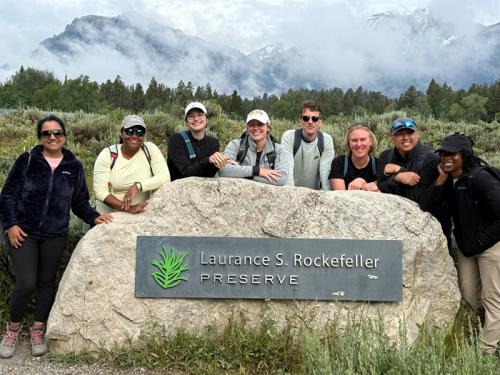
Program Overview
- Course Number: IHSD 6470-01
- Credits: 3
- Dates: July 29-July 10 2026
- Location: Dubois, Grand Teton National Park, and surrounding regions, Wyoming, USA
- Faculty Lead: Nancy Mock, DrPH
- Eligibility: Open to WSPH graduate students and others by approval
- Prerequisites: None
- Language of Instruction: English
This intensive two-week field course immerses students in the realities of public health leadership in the context of environmental and social disruption. Based in rural Wyoming—home to some of the most ecologically and culturally significant areas in the United States—the course explores the intersection of leadership, sustainability, systems thinking, and crisis response through site visits, case-based learning, and outdoor experiential activities. Students engage directly with tribal health leaders, wilderness medicine practitioners, conservationists, and public health professionals to study real-world examples of adaptive leadership in the face of challenges such as climate change, resource conflict, and access to care in rural areas.
“This course completely reshaped the way I see leadership and sustainability.”
“It was the most transformative academic experience I’ve had—professionally and personally.”
“The setting, the topics, the people. Everything aligned to help me grow as a public health leader.”
- Leadership Development: Explore frameworks and debates around leadership and followership, including leadership in extreme contexts and complex adaptive systems.
- Systems Thinking & Sustainability: Analyze the public health implications of environmental disruptions through the lens of sustainability science, the triple bottom line, and risk framing.
- Field-Based Learning: Participate in structured case studies and debates in Grand Teton National Park, on fracking sites, and with Native American health initiatives.
- Optional Wilderness Module: Join a certified guide team on a 3-day backcountry excursion to apply leadership and survival principles in a real-world setting.
Students will complete pre-course readings and reflection assignments beginning in May, followed by a two-week, in-person immersion. Daily activities include field visits, student-led discussions, expert lectures, and small group casework.
Topics include:
- The role of public health in land use and conservation decisions
- Fracking, fossil fuels, and rural health
- Indigenous health systems and telehealth innovation
- Leadership in disaster preparedness and emergency response
The course will be held primarily at a ranch-based education center in Dubois, Wyoming, with travel to surrounding areas including Grand Teton National Park and tribal health facilities. Students are responsible for arranging transportation to Jackson Hole Airport (JAC) or Dubois, WY. Group transportation will be provided during the course.
Housing, some meals, and local excursions are included in the course fee.
Apply Now
Enrollment is limited to ensure an immersive and high-impact experience. Interested students should contact Sarah Truxillo, Dr. Nancy Mock, or the Office of Global Health for more information.
This course fulfills elective credit for select WSPH programs.
Early application is encouraged.
